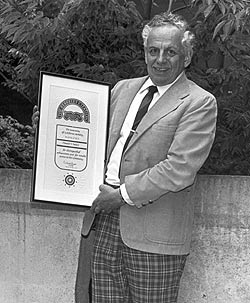Berkeleyan
Obituary
Donald Noyce
![]()
10 November 2004
 Donald Noyce (Photo courtesy the College of Chemistry) |
Noyce was born in Burlington, Iowa, in 1923 and received his B.A. from Grinnell College in 1944. He pursued his graduate studies at Columbia University and received his Ph.D. in 1947. Noyce joined the Berkeley faculty in 1948 as a chemistry instructor and worked his way up the academic ladder, becoming a full professor in 1960. In 1957, he was the recipient of a Guggenheim Fellowship and spent six months studying in London and Zurich. He retired from Berkeley in 1986, at which time he was awarded the Berkeley Citation for his service to the campus.
He was known for his special concern for undergraduate students and, as assistant and then associate dean of undergraduate affairs — positions he held for 22 years — was responsible for implementing the college’s highly regarded system of student advising. In addition, he was responsible for organizing the college’s commencement ceremony each year from 1974 to 1986, interacting enthusiastically with students.
Noyce enjoyed a reputation as one of the college’s best teachers, and for many years was principally responsible for Organic Chemistry for Biological Students, a large, demanding course taken by thousands of pre-medical students. His love of teaching was recognized by the Donald Sterling Noyce Prize, an award established in his name by his brother, Intel co-founder Robert N. Noyce, to reward excellence in undergraduate teaching; Donald Noyce was the first recipient. Noted a former student: “Besides being an excellent teacher and administrator, Professor Noyce is a kind and amiable person who always takes the time to be courteous and to treat his students as fellow human beings.”
He published more than 100 articles and directed the work of nearly 40 graduate students. Noyce was particularly known for his work on acid-catalyzed reactions, proton addition reactions, and the reactivity patterns of heterocyclic systems. Working in the basement of the old Chem building, Noyce made significant contributions to carbocation chemistry. Among his many notable research accomplishments: determining the mechanism of the acid-catalyzed and base-catalyzed aldol condensation; elucidating the mechanism of the acid-catalyzed isomerization of cis-trans bonds in olefins; and pioneering the study of conformational equilibrium by low-temperature proton magnetic resonance measurements.
He is survived by his wife of 58 years, Bettie, of Oakland; son, Robert, of Eau Claire, Wis.; son, Donald, of Grand Marais, Minn.; daughter, Nancy, of Ashland, Ore.; and seven grandchildren.
A memorial celebration of his life will be held in the Sky Room at Piedmont Gardens, 110 41st St., Oakland, at 1:30 p.m. on Saturday, Nov. 13. The family has requested that any contributions in his memory be sent to Grinnell College, Grinnell, IA 50012 for student scholarships.
— Yvette Subramanian

